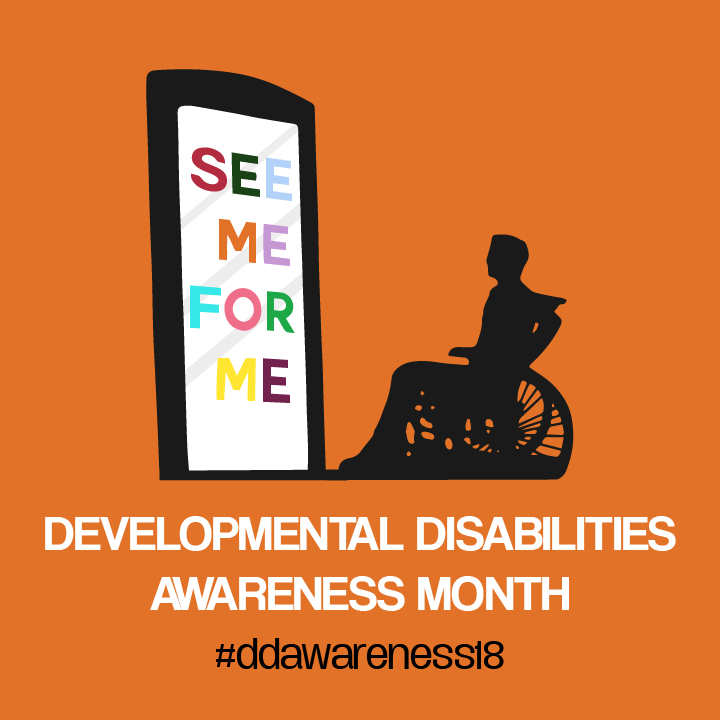 This year’s theme for Developmental Disabilities Awareness Month is “See Me for Me.” The theme encourages us to look beyond someone’s disability and see each individual as a whole person. People with developmental disabilities generally want the same sorts of things we all do. They want to live in the community, work and earn a living wage, go to school or college, have friends, go on dates, lead a healthy life, and be active in a faith or other social community. Sometimes it’s as simple as Staci Christensen’s dream to go outside after midnight to look at the stars just because she feels like it.
This year’s theme for Developmental Disabilities Awareness Month is “See Me for Me.” The theme encourages us to look beyond someone’s disability and see each individual as a whole person. People with developmental disabilities generally want the same sorts of things we all do. They want to live in the community, work and earn a living wage, go to school or college, have friends, go on dates, lead a healthy life, and be active in a faith or other social community. Sometimes it’s as simple as Staci Christensen’s dream to go outside after midnight to look at the stars just because she feels like it.
We know from research that people who live in the community tend to have more choices and control over their lives, have more friendships, are more engaged in their communities, are safer, and experience greater life satisfaction. These benefits help explain why many of the estimated 6.2 million Americans with intellectual or developmental disabilities (IDD) live in the community, in a variety of settings. Most live with their families but others live in apartments, with host families, or in small group homes
ACL was created to improve community living opportunities for older adults and people with disabilities. Unfortunately, we know all too well that abuse and neglect of individuals with developmental disabilities can happen no matter where an individual lives. Therefore, promoting safety and protecting individuals' rights in the community is a central part of ACL's work.
Recently, we worked with our federal partners in HHS’ Office of Inspector General (OIG) and Office of Civil Rights (OCR) on a joint report, Ensuring Beneficiary Health and Safety in Group Homes Through State Implementation of Comprehensive Compliance Oversight. This report contains workable, holistic solutions that states can use to protect the health and safety of people living in group homes. To assist states in making improvements, OIG partnered with ACL and OCR, along with the Department of Justice, to develop model practices that help address gaps in reporting and monitoring efforts.
This cross-HHS partnership is just one of many ACL initiatives to support safety and community living for people with developmental disabilities. Through our Living Well grants, we are testing models aimed at building a more comprehensive system to support quality community living. Working in three states – Virginia, New Hampshire, and Georgia – these grants are supporting the development of model approaches for enhancing home and community based services by integrating two core components – community monitoring and capacity building through activities such as peer-to-peer support and training of the direct care workforce.
ACL's Developmental Disabilities Act grantees – the protection and advocacy systems (P&As), University Centers for Excellence in Developmental Disabilities Education, Research, and Service (UCEDDs) and State Councils on Developmental Disabilities (DD councils) – engage in a wide range of activities to strengthen community living for individuals with developmental disabilities. P&As conduct monitoring activities in a variety of settings, including group homes and other residential facilities. They investigate allegations of abuse, and work with states or residential settings to correct issues when they occur. For example, Washington's P&A receives funding from the state for the Washington Developmental Disabilities Ombuds Program which work on systemic-level monitoring, investigating, and reporting.
The direct-support workforce also plays a critical role in ensuring the health, safety, and well-being of individuals living in the community. A number of UCEDDs and DD councils are directly providing or investing in training for the direct support workforce through the College of Direct Support operated by the Institute on Community Integration at the University of Minnesota. This on-line program offers a nationwide, competency-based training curriculum to enhance the skills and knowledge of direct support professionals, frontline supervisors, and managers supporting individuals with developmental disabilities in community settings. Many DD councils also have initiatives helping to create a workforce that is skilled, trained, supported, and has advancement opportunities. For example, North Carolina's Council is supporting the NC National Alliance of Direct Support Professionals (NADSP) to advance the quality of the workforce that supports individuals with disabilities by promoting increased competency, professionalism, and a voice in decision-making.
It is also important to help individuals with developmental disabilities recognize what constitutes abuse and how they can report it. ACL grantees in several states are providing training and resources on this topic. The Institute for Human Development at the University of Missouri-Kansas City has partnered with their state DD agency and the Missouri DD Council to develop an iPad and iPhone application promoting self-determination and the prevention of sexual abuse for use by persons with developmental disabilities, family members, and care providers.
By supporting these efforts, we are helping to strengthen the quality of care in the community so that individuals with developmental disabilities can live full lives free of abuse or neglect. The stories of former residents of Rosewood, a residential facility for people with intellectual and developmental disabilities near Baltimore, MD that closed in 2009 remind us of the importance of such efforts and that quality living in the community is an achievable outcome.

